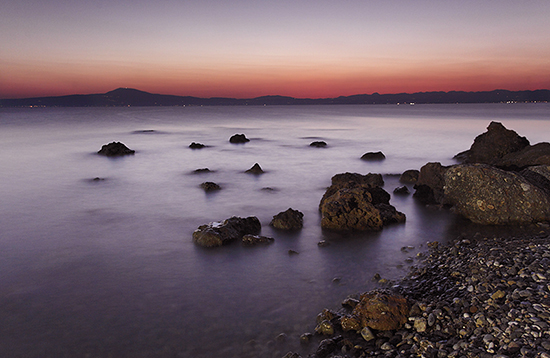Tutorials
What's the Point?
 One comment raised in our group was that it perhaps needed some kind of focal point – an unusual rock or a boat or something. Initially I thought this was perhaps true. Later, however, it did make me go back to something I preach in my book, Mastering Composition, about the importance of considering the intention of the photographer at that time. I thought back to that location and what I was likely to have been experiencing at the time and perhaps subconsciously wanting to convey. Strolling down onto the pebbly beach I would have had a sense of relief from the oppressive heat of earlier in the day with a nice cooling breeze coming in. It would have been very quiet and peaceful (again in contrast to earlier in the day) with the waves gently lapping at the shore. I had the place to myself and would have been relishing this isolation, peace and calmness. These are perhaps the qualities we should look for in this image to see if I achieved my aim as a photographer.
One comment raised in our group was that it perhaps needed some kind of focal point – an unusual rock or a boat or something. Initially I thought this was perhaps true. Later, however, it did make me go back to something I preach in my book, Mastering Composition, about the importance of considering the intention of the photographer at that time. I thought back to that location and what I was likely to have been experiencing at the time and perhaps subconsciously wanting to convey. Strolling down onto the pebbly beach I would have had a sense of relief from the oppressive heat of earlier in the day with a nice cooling breeze coming in. It would have been very quiet and peaceful (again in contrast to earlier in the day) with the waves gently lapping at the shore. I had the place to myself and would have been relishing this isolation, peace and calmness. These are perhaps the qualities we should look for in this image to see if I achieved my aim as a photographer.
So, we can also see that perhaps the lack of a focal point may in fact be a good thing in this case. There is nothing defined for our brains to latch onto, allowing for a more meditative contemplation of the image. We are freer to enjoy the colours, textures and mood of the scene. Indeed the emptiness helps give a sense of isolation and timelessness.
There is one member of our club who when presenting images often comments that he feels “it could do with a person just at that point”. He has found himself saying this so often that he now laughs with the rest of us when raising the possibility. Perhaps there is a more cerebral side to our perception of images that supported by our conditioning demands this focal point and an associated definable message or question that it raises. However, we also need to acknowledge that perhaps that wasn’t the intention of the photographer and that another type of image can still work in a very different way.
So, remember to ask yourself “What’s the point of the photograph?”